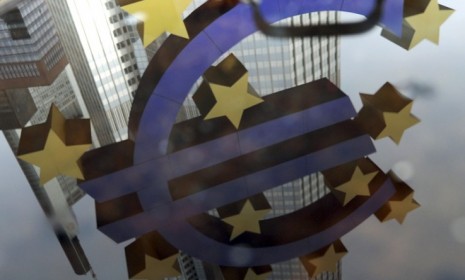This week's EU summit: The last chance to save the euro?
With Spain's borrowing costs skyrocketing and Cyprus begging for billions in aid, Europe's leaders find themselves with their backs against the wall

A free daily email with the biggest news stories of the day – and the best features from TheWeek.com
You are now subscribed
Your newsletter sign-up was successful
When European Union leaders meet on Thursday in Brussels, they will be under immense pressure to finally agree to the types of far-reaching reforms considered necessary to resolve the continent's long-running debt crisis. This week, tiny Cyprus became the fifth European country to seek a bailout, a sign that the crisis is only spreading. Spain's borrowing costs have risen to perilous levels, even though European leaders have already announced a whopping 100 billion euro bailout for the country's banks. And in another sign that the crisis has finally come to a head, on Monday billionaire George Soros went so far as to predict that Europe had a mere 72 hours to live. Is the upcoming summit the last chance to save the euro?
Yes. And European politicians will likely fail: "This week's summit of European leaders is the last real chance to save the euro," says Jim Jubak at MSN Money. They must produce a long-term plan to bring the euro's members under a central finance authority and share their debt burden, plus short-term plans to ease borrowing costs for Italy and Spain. If they don't, "the momentum toward dissolution of the common currency will be irresistible." And there are few reasons to be optimistic: "The euro is cooked. Stick a fork in it."
"Europe plays 'let's make a deal'"
The Week
Escape your echo chamber. Get the facts behind the news, plus analysis from multiple perspectives.

Sign up for The Week's Free Newsletters
From our morning news briefing to a weekly Good News Newsletter, get the best of The Week delivered directly to your inbox.
From our morning news briefing to a weekly Good News Newsletter, get the best of The Week delivered directly to your inbox.
Yes. And the world better brace for pain: "After two years of 'kicking the can down the road,' Europe seems to have now come to the end of the road," says John Nyaradi at MarketWatch. Analysts are hoping that a last-minute commitment to greater financial centralization will do the trick, but "underneath the surface of the European Union, strong forces of nationalism still exist." Once the euro goes, "the result will most likely be global recession, even depression, double-digit unemployment across Europe, bank runs, currency devaluations, and economic chaos."
"The end of the road for Europe"
Yes. And the euro will be saved: "The worst can still be prevented, and Europeans still have the ability to save their common currency," says Germany's Der Spiegel. It will be a massive task, but the costs of failing are simply too great. European countries "must surrender power to Brussels" while proving "that they could successfully reform and modernize their economies." The "quarreling nations of the old continent" have proved equal to the challenge before, and history shows that "solutions are only reached in Europe when the continent has run out of options."
"The disastrous consequences of a euro crash"
A free daily email with the biggest news stories of the day – and the best features from TheWeek.com
-
 The ‘ravenous’ demand for Cornish minerals
The ‘ravenous’ demand for Cornish mineralsUnder the Radar Growing need for critical minerals to power tech has intensified ‘appetite’ for lithium, which could be a ‘huge boon’ for local economy
-
 Why are election experts taking Trump’s midterm threats seriously?
Why are election experts taking Trump’s midterm threats seriously?IN THE SPOTLIGHT As the president muses about polling place deployments and a centralized electoral system aimed at one-party control, lawmakers are taking this administration at its word
-
 ‘Restaurateurs have become millionaires’
‘Restaurateurs have become millionaires’Instant Opinion Opinion, comment and editorials of the day